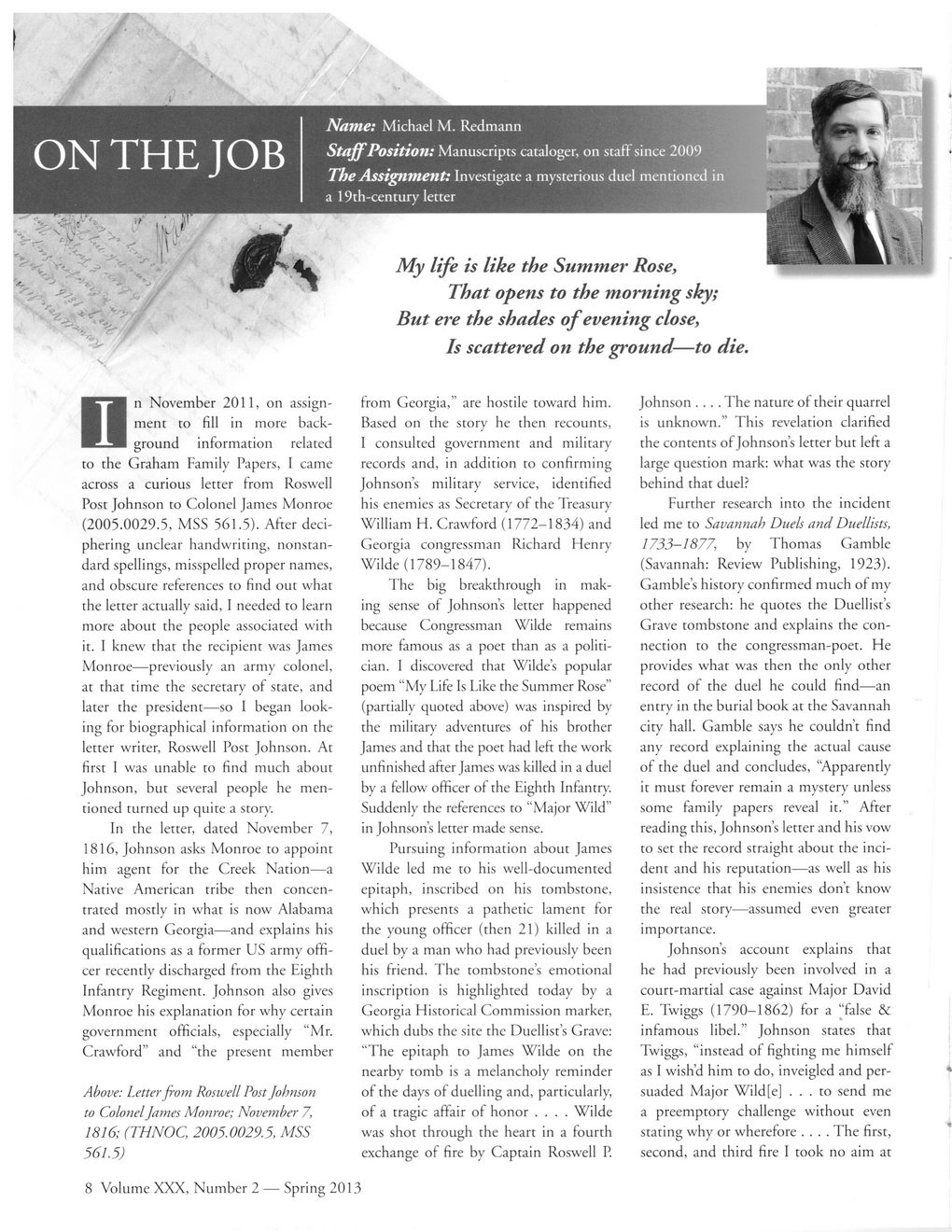This text was obtained via automated optical character recognition.
It has not been edited and may therefore contain several errors.
ON THE JOB -t- c-X v > :\ 7'1 Name: Michael M. Redmann Staff Position: Manuscripts cataloger, on staff since 2009 The Assignment: Investigate a mysterious duel mentioned in a 19th-century letter My life is like the Summer Rose, That opens to the morning sky; But ere the shades of evening close, Is scattered on the ground—to die. In November 2011, on assignment to fill in more background information related to the Graham Family Papers, I came across a curious letter from Roswell Post Johnson to Colonel James Monroe (2005.0029.5, MSS 561.5). After deciphering unclear handwriting, nonstandard spellings, misspelled proper names, and obscure references to find out what the letter actually said, I needed to learn more about the people associated with it. I knew that the recipient was James Monroe—previously an army colonel, at that time the secretary of state, and later the president—so 1 began looking for biographical information on the letter writer, Roswell Post Johnson. At first I was unable to find much about Johnson, but several people he mentioned turned up quite a story. In the letter, dated November 7, 1816, Johnson asks Monroe to appoint him agent for the Creek Nation—a Native American tribe then concentrated mostly in what is now Alabama and western Georgia—and explains his qualifications as a former US army officer recently discharged from the Eighth Infantry Regiment. Johnson also gives Monroe his explanation for why certain government officials, especially “Mr. Crawford” and “the present member Above: Letter from Roswell Post Johnson to Colonel James Monroe; November 7, 1816; (THNOC 2005.0029.5, MSS 561.5) from Georgia,” are hostile toward him. Based on the story he then recounts, I consulted government and military records and, in addition to confirming Johnson’s military service, identified his enemies as Secretary of the Treasury William H. Crawford (1772-1834) and Georgia congressman Richard Henry Wilde (1789-1847). The big breakthrough in making sense of Johnson’s letter happened because Congressman Wilde remains more famous as a poet than as a politician. I discovered that Wildes popular poem “My Life Is Like the Summer Rose” (partially quoted above) was inspired by the military adventures of his brother James and that the poet had left the work unfinished after James was killed in a duel by a fellow officer of the Eighth Infantry. Suddenly the references to “Major Wild” in Johnson’s letter made sense. Pursuing information about James Wilde led me to his well-documented epitaph, inscribed on his tombstone, which presents a pathetic lament for the young officer (then 21) killed in a duel by a man who had previously been his friend. The tombstone’s emotional inscription is highlighted today by a Georgia Historical Commission marker, which dubs the site the Duellist’s Grave: “The epitaph to James Wilde on the nearby tomb is a melancholy reminder of the days of duelling and, particularly, of a tragic affair of honor .... Wilde was shot through the heart in a fourth exchange of fire by Captain Roswell P. Johnson .... The nature of their quarrel is unknown.” This revelation clarified the contents of Johnson’s letter but left a large question mark: what was the story behind that duel? Further research into the incident led me to Savannah Duels and Duellists, 1733—1877, by Thomas Gamble (Savannah: Review Publishing, 1923). Gamble’s history confirmed much of my other research: he quotes the Duellist’s Grave tombstone and explains the connection to the congressman-poet. He provides what was then the only other record of the duel he could find—an entry in the burial book at the Savannah city hall. Gamble says he couldn’t find any record explaining the actual cause of the duel and concludes, “Apparently it must forever remain a mystery unless some family papers reveal it.” After reading this, Johnson’s letter and his vow to set the record straight about the incident and his reputation—as well as his insistence that his enemies don’t know the real story—assumed even greater importance. Johnson’s account explains that he had previously been involved in a court-martial case against Major David E. Twiggs (1790—1862) for a “false & infamous libel.” Johnson states that Twiggs, “instead of fighting me himself as I wish’d him to do, inveigled and persuaded Major Wild[e] ... to send me a preemptory challenge without even stating why or wherefore .... The first, second, and third fire I took no aim at 8 Volume XXX, Number 2 — Spring 2013

New Orleans Quarterly 2013 Spring (08)